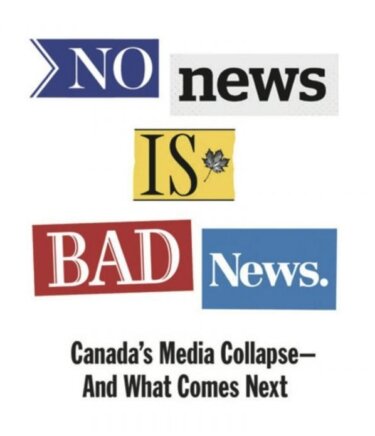Being the bearer of bad news
On the road with a new book on the state of Canadian media
It’s not common to leave town when you’re about to launch a book — in my case a chronicle of the decline of Canadian media — but that’s what I did in early September. The day before leaving on a long-scheduled trip to France, I taped an interview with Jesse Brown for the podcast CANADALAND. Then I skipped the country.

Four days later, I was hiking across the border into Spain on the Camino de Santiago when I tuned into CANADALAND and was reminded that I don’t have a great voice for radio. It was a bit surreal being so far from home, hearing myself answering questions about my book, which paints a pretty bleak picture of drastic declines in Canada’s legacy media. Brown never misses a chance to go all doomsday on the state of our fourth and fifth estates, so we spent most of the podcast agreeing with each other. We didn’t spend nearly enough time talking about promising new digital alternatives, some of which I discovered on an earlier research trip to Europe; some of which, like Discourse Media, where I now work, I found on my doorstep.
Thankfully, Discourse’s editor-in-chief and CEO Erin Millar picked up my slack a few weeks later and did a great job getting Brown to concede that there might be a bright future in solutions journalism. Discourse, Brown said, “might be the most interesting startup in the country.” Here’s to that. Meanwhile, although my book is called No News Is Bad News, its subtitle probably best captures the tension that is palpable right now in Canadian media: Canada’s Media Collapse — And What Comes Next.
My European pilgrimage complete, back in Canada in the third week of September my book promotion started in earnest. In Toronto, at the Centre for Social Innovation, I was fortunate to participate in the first Hacks/Hackers Connect conference in Canada, put on in partnership with Google News Lab.
This was a crowd of journalists, engineers, funders (well, a few), publishers, podcasters and social activists. This was not a crowd that had to be sold on the idea that Canadian journalism is in dire straits. A lot of questions, inevitably, were about new funding models. Without a doubt, this is the top-of-mind question for journalists across the country. Where’s the moolah going to come from to pay for journalism when 10,000 journalists have lost their jobs and one in six newspapers in Canada have closed in the past five years?
To be honest, the answer isn’t obvious, and I don’t pretend that the “what comes next” section of my book magically answers its own question. A lot of experimentation, maybe some help from philanthropy, maybe some government intervention (as hazardous as that might be), maybe some angel investors along the way, and, inevitably, more failure than success.
 The book promotion pathway includes both plaudits and brickbats. Someone from The Huffington Post Canada took umbrage with my remark that they “produce very little original Canadian content,” and I take the point that there is more now than met the eye when I wrote that. BuzzFeed, I said in the same paragraph, had opened a Toronto bureau, but what they produced “can hardly be confused with journalism.” Some of what BuzzFeed has produced more recently, happily, can.
The book promotion pathway includes both plaudits and brickbats. Someone from The Huffington Post Canada took umbrage with my remark that they “produce very little original Canadian content,” and I take the point that there is more now than met the eye when I wrote that. BuzzFeed, I said in the same paragraph, had opened a Toronto bureau, but what they produced “can hardly be confused with journalism.” Some of what BuzzFeed has produced more recently, happily, can.
The fact is that changes — good and bad — are happening to the industry at lightning speed, which causes any book, itself produced at lightning speed, to fall behind the times. Postmedia — how to keep up with that saga? Soon after my book chronicled what a fiasco that place is, they announced another $99.4-million quarterly loss and plans for another 20 per cent cut in salary costs. When all you have left to cut is people, well, what else to say than that we live in troubled times?
Another side effect from having a book out about a subject that is suddenly topical is that the government might show some interest. I was in Winnipeg at the end of September, doing a couple of readings at the Thin Air festival, when a senior bureaucrat at the Department of Canadian Heritage scheduled a call and asked for my views on what ails, and what can avail, Canadian media. Of course I plumped for support for digital upstarts like Discourse, The Tyee and others. But I also said that if the department , which is conducting more reviews of Canadian media than a drill sergeant at West Point, were to do one thing to help Canadian media, it should not support or in any way prolong the survival of dying newspapers — which is pretty much all of them.
The man seemed aghast. I paraphrase, but essentially what he said was: all we hear is that this industry is in real trouble and we need to bail them out. To which I replied: they no longer produce anything of value, their already-subsidized business models have failed, they ill-serve the Canadian public, and government should spend not one red cent of taxpayers’ money saving them. That’s such a contrarian view, he said, the opposite to everything else we’ve heard. From whom? I asked. Well, he said, from legacy media themselves. In early October, it was reported that Newspapers Canada had lobbied the federal government 14 times in a few short months, which was 14 more times than they had done in the previous year.
I wrote in my book that Canadian media owners and investors have failed us, “being far too slow to have seen, let alone responded to, the massive disruptions that the Internet has wrought on media the world over.” A Dell Technologies survey that came out after the book was published called Canada a “digital laggard” that ranks 13th out of 16 countries in what it called a “digital transformation index.” The survey singled out our media firms for having suffered losses in advertising and “retreating from print.” I asked a class of second-year media students at Capilano University soon after how many of them read a newspaper every day. There were 19 students, two of whom raised their arms tentatively; turns out they read a newspaper maybe three or four times a week, not every day. The other kids, not at all. No matter — in a decade or so that probably won’t be an issue, because they probably won’t have a newspaper to choose from anyway.
What’s it like to be a harbinger of doom? Well, that last talk was the day after Halloween, so it seemed seasonal, if nothing else. But mostly, it was fascinating to discover that radio hosts — CBC, commercial radio, co-op radio, campus radio, Radio Canada International and others — were totally up for a discussion about the dire state of our media. Do they feel immune? Not really, but they had the courage to at least entertain a discussion. Mainstream newspapers, to the extent that they still exist, seemed less inclined to even mention a book that suggests their days are numbered.
The arc of my adventures on the book circuit probably now bends more to the remainder table than to the top of the bestseller list. It’s been days since I did a radio interview! And anyway, given what just happened in the U.S. election, there are rather more immediate and important questions right now for our craft, given how problematic the coverage of the election was, and how remarkably off-base the predictions of the pollsters and so-called experts were.
Journalism in Canada is not immune to the same problems we’ve seen south of the border, and the fact is, the industry is on the ropes everywhere. For me, there’ll be another public panel or two, and I have a magazine story in the works about the state of Alberta’s newspapers for which I am actually being paid. Not everyone has been thrilled by the message of No News Is Bad News, and who can blame them? But this is Canada, thank goodness. No one has shot the messenger. In fact, I get to live another day at Discourse. Having chronicled Canada’s media collapse, I am grateful to have an opportunity to work on what comes next.
